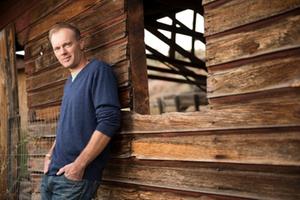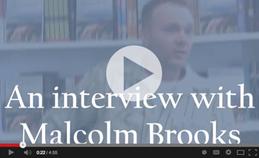
|
|
| Photo: Jeremy Lurgio | |
Malcolm Brooks was raised in the foothills of the California Sierras, and grew up around Gold Rush and Native American artifacts. A carpenter by trade, he has lived in Montana for most of two decades. His writing has appeared in Gray's Sporting Journal, Outside, Sports Afield and Montana Quarterly, among others. We recently talked to Brooks about his home state, horses and the dream of going West.
How does it feel to have your first novel coming out?
It's been such a long time frame that it's hard to wrap my head around it as reality. And my daily life is unchanged as yet. I'm a carpenter and remodel contractor, just still doing that every day. It's odd to still be pulling people's toilets every day and doing this type of work that is not in the slightest bit indicative of having a novel coming out.
The last six months have been so surreal to me because I'm actually getting the reaction of people who've not been involved in the production of the book. It's really bizarre to see how something I came up with and lived with solo for a long time winds up having this whole other positive secondary life outside of my own sphere.
What does Montana mean to you?
I was born outside Philadelphia, in the southern part of New Jersey, and my parents were rootless, comparatively speaking. We went to Southern California when I was 10 and ultimately wound up in Northern California. I was fascinated by the west from a young age, so when my parents decided to move, even as a 10-year-old I had this romanticized idea that we were following the trail west. We wound up not in this landscape of cowboy movies which I was expecting, but in Orange County, California.
I had these dreams of doing the real mythical western thing, and Montana was representative of that. All the magazine articles in Field and Stream, the locations they were talking about were Montana, Idaho, Wyoming. Then, when I was 14, my eighth-grade English teacher gave me the novel Lonesome Dove, which had just come out. She recognized what my sensibilities were, so she asked my parents if it was okay to give me the book. I grew up in kind of wacky religious circumstances, but by some minor miracle, my parents said, sure, give him whatever you want to give him. I read the book and it utterly changed my life, the springboard moment for me, and the place they're trailing the cattle herd to in the novel is Montana. Later I started to read Jim Harrison and A River Runs Through It, and it was Montana, Montana, Montana. I moved here when I was 24, and I've never left.
Even though I do live in Montana, in the western part of the state, I'm writing about the eastern part. It doesn't quite get the play that the western part of the state does, but it's a part of Montana that I love.
Horses and the human/equine relationship figure enormously in your story, and John H's knowledge of equine behavior is impressively detailed. Did you have to research the topic, or are you an old hand around a horse?
A little bit of both. I was always interested in horses, and wherever we happened to live, I always managed to, for lack of a better word, wrangle a way to have access to horses. Northern California is kind of the cradle of endurance riding and is real Arabian horse country. I was lucky enough, or unlucky enough, to end up on the backs of some crazy Arabian horses that were pretty hot-blooded. You had to really have your wits about you on them, but I learned to ride fairly well on those horses, and even now I exercise my neighbor's horses. I'm grateful I've always managed to have horses in my life without having to be the person who writes the check for them.
Beyond that, I know a guy named Randy Rieman fairly well, and he's a pretty significant--well, I try not to use the term "horse whisperer" if I can avoid it, but he's what people regard as someone who has a really intuitive understanding of horses. I don't know if you know who the Dorrance brothers were, but they were some of the models for Nicholas Evans's character in The Horse Whisperer. They're long gone now, they were really antique when The Horse Whisperer was made, but Randy Rieman was a protégé of theirs. He's the greatest guy and helped vet the horse stuff for me in the novel.
 A major theme of Painted Horses is preservation versus progress. What are your thoughts on tradition losing out to dreams of the future?
A major theme of Painted Horses is preservation versus progress. What are your thoughts on tradition losing out to dreams of the future?
I think it's this endless push and pull in the human arc, and I also think--and this is probably the one way in which you could describe me as having a postmodernist sensibility--that we live in the first human era in which we're really totally aware of the impact of human progress and human survival on the very things that sustain us and the environment both in a subsistence way and a spiritual way. I don't think environmentalism is appealing to people as a general rule except for abstract reasons. However, if you can make the argument that we're damaging ourselves and our own future and also our own spiritual ability, not to get too woo-woo with it, to embrace and have a completely enriched experience within the world that we occupy, you can get a lot farther with that honey than you can with the doctrinaire vinegar of "humans don't have a right to run roughshod over everything."
How did you prepare to write from the female perspective?
I think I'm a good listener and a good observer, and once I got into Catherine's character, I tried to find things in common from my own experience to what a young woman, especially in the 1950s, might be attempting to chart her course with. I read a lot of female authors, and once I jumped into it, I didn't find that it was a struggle to write about her. I also knew from the get-go that I wanted a female editor, and within two minutes of our first telephone conversation, I absolutely knew that I wanted Amy Hundley to be my editor. When we went through the editing process, we did nothing with John H at all. What we mostly did was work on Catherine, and I think Amy described it best: we just have to give her as much heft as John H has because she has to balance him totally in the book.
Probably the biggest compliment to me is I've had a number of women of different ages tell me that they would forget they were reading a book that had been written by a man. I mean, I can't ask for anything more complimentary than that. --Jaclyn Fulwood

